Inside: When baby cries after a bath, it can break your heart (and your ear drums). We’ve rounded up 13 ways to calm baby quickly and/or prevent crying after baths altogether, plus advice on how often you actually need to do baths in the first place.
You’ve got the lavender bath soap and lotion all ready to go. Perfect for winding down and getting baby ready for sleep. Yes! Winning!
But the second you pull that naked little stinker out of the bath, the ear-piercing screams start. There’s nothing like baby cries screams to put you on edge.
Right after the bath that was supposed to be part of your bedtime routine and calm your baby, not rile them up!
Getting your baby out of the bath and dressed afterwards can feel like torture. Well, for you at least, and it sure seems like baby feels the same way.
Rest assured, it’s not just you: most babies are NOT big fans of getting out of the bath.
Pretty much every parent can use these tips for calming baby after bath time. Hopefully, these help make the whole bath ordeal a lot less “Can we never bathe our baby again?” level painful.
(Because if we’ve learned anything from Europeans back in the day, it’s that taking baths only once a year is not such a great idea.)
You Might Also Like: Baby Crying in Their Car Seat? Here Are 15 Ways to Make It STOP
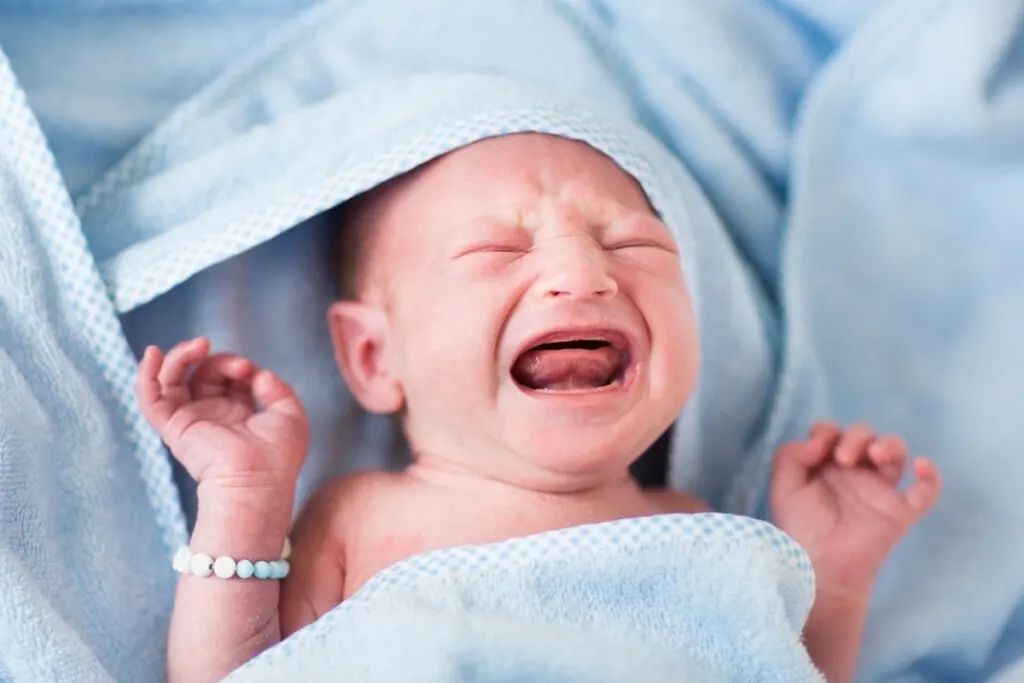
Why Do Babies Cry After Their Bath?
THIS POST PROBABLY CONTAINS AFFILIATE LINKS. AS AN AMAZON ASSOCIATE, I EARN FROM QUALIFYING PURCHASES. YOU CAN READ OUR FULL DISCLOSURE POLICY HERE.
You probably know this, but babies cry after baths because they’re cold and uncomfortable. Ya know, like how you feel after getting out of a hot shower smack dab in the middle of winter. Not fun.
Some babies despise the entire bathing process: from getting naked, to the bath itself, to the time after the bath. They scream and cry from start to finish.
But even the babies that seem to geuninely love baths (warm soothing water, that gentle massage of getting cleaned, what’s not to love?) may hate, hate HATE those two minutes between leaving the tub and getting dressed.
Babies can get used to being warm while they are in the water, so when they get out their skin temperature can drop quickly, making them cold and uncomfortable and causing them to cry.
They may also be sensitive to a product being used on their skin either in or after the bath, or they could just be overtired.
But don’t worry, I have solutions for each and every after bath crying cause!
You Might Also Like: How to Potty Train a Baby – The Ultimate Guide from a Mom Who Did It
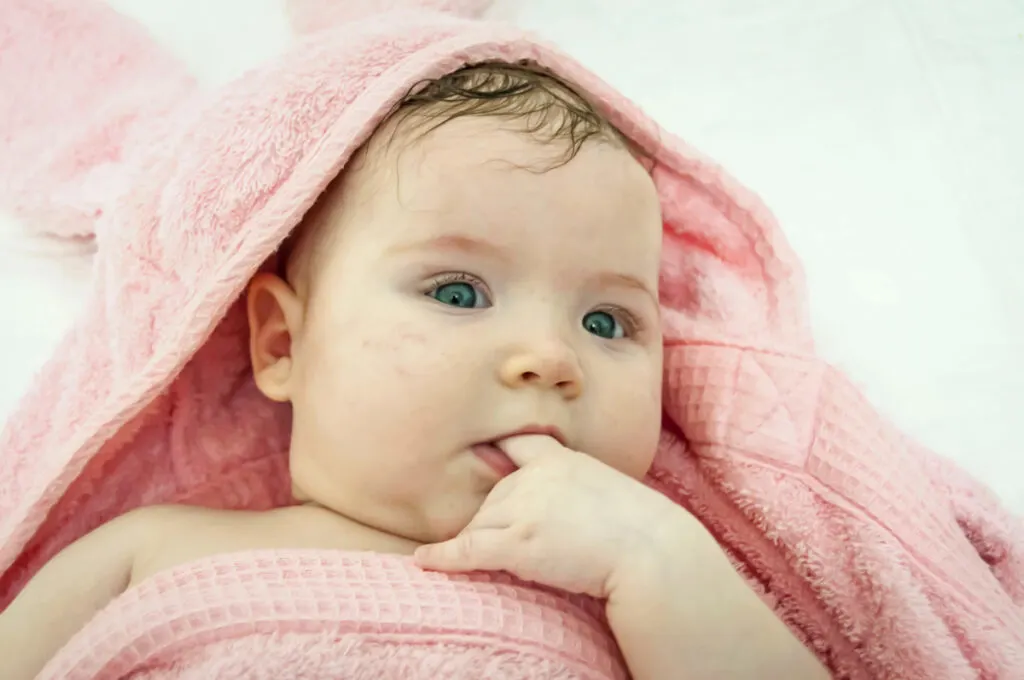
How Often Do Babies Need a Bath, Anyway?
There is A LOT of debate as to how often babies need a bath. Welcome to the confusing world of parenting.
Some pediatricians recommend giving your baby a light “sponge bath” with just water every day, while others suggest that you give them a full bath only once a week.
Mayo Clinic suggests bathing a baby beginning with three times per week and later increasing that number, while Healthline suggests bathing your baby only once or twice per week at first.
Try not to bathe your baby too much. Definitely do not follow in my footsteps and make it part of your nightly routine from a young age (also because then, you feel stuck to that bedtime routine for life).
Bathing too frequently can also dry out their skin, and most products – yes, the ones marketed for babies – actually contain not-so-great ingredients that can be absorbed by your baby’s delicate skin.
If you’re thoroughly cleaning them up after dirty diapers and spit up, you don’t need to bathe them very often. Especially before they start walking, it’s not like they’re out there getting dirty all the time.
Bottom line? Less is more when it comes to baths.
You Might Also Like: 9 Ways to Keep Your Baby From Climbing Out of the Crib
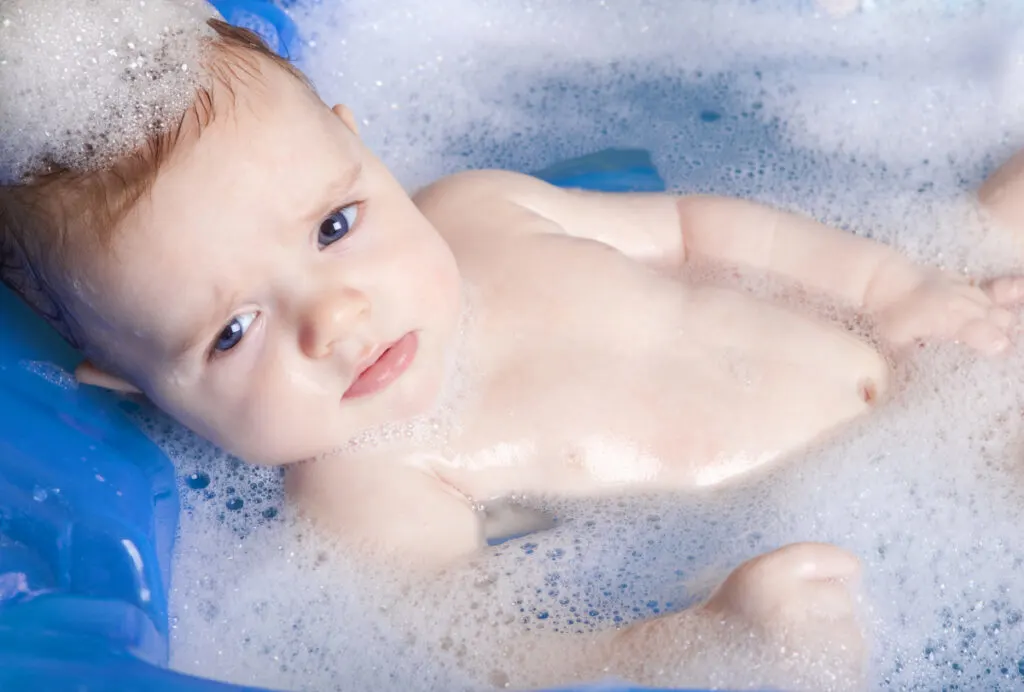
13 Ideas to Quickly Stop Baby Crying After Bath
Not all of these tips will work for every baby or every parent.
I’ll offer lots of ideas: try them out, a few at a time and see what works best for your baby. Tip #1 might revolutionize bath time for one baby, when tips #3 is a total game-changer for another.
Here’s to less crying, more calm, and easier baths in your future!
1. Prep everything beforehand.
Lay out as much for the post-bath routine in the bathroom beforehand as possible. Get your baby’s towel, clothes, diaper, lotions, etc. all right next to you within reach in the bathroom.
If you can reduce the amount of time between removal from the bath and being fully dressed you can reduce the post-bath tears.
2. Warm up the room.
Many babies cry after the bath because they are being removed from their warm water into the cold air.
Even if the air doesn’t feel cold to you, the difference between the temperature of the bath water and the temperature of the air might feel pretty drastic to your baby.
If you can get the room temperature a lot closer to the water temperature your baby might not even cry after the bath.
If your bathroom doesn’t have a heater built in, bring in a space heater for the short bathtime and warm that room up fast!
3. Warm their clothes.
You’ve warmed up the room. Why not warm up the clothes, too?
You can try warming their clothes and towel in the dryer during their bath and have your partner bring them to you when bath time’s almost done.
No partner? Put them on a heating pad, instead. Just don’t forget to unplug the heating pad.
Never leave a baby alone in the bath no matter how shallow the water is. Be sure you have someone else to bring you things from the dryer if you plan on trying this tip.
4. Switch bath wash products.
Your baby’s after bath tears might be more than a reaction to the temperature change. They may be alerting you that their skin does not love whatever bath products you use.
If you can afford it, switch to a hypoallergenic product.
Even if you already are, there’s a chance they may have a sensitivity to something in the product anyways, so you can always try another just to rule out that as a potential after-bath crying cause.
Try THIS allergen-free baby bath wash. I fully trust this brand, since my daughter who has eczema and is allergic to a lot of skincare ingredients can use it safely.
5. Try different after bath lotion, or skip it altogether.
Your baby may also have a sensitivity to any after bath products you are using.
Most baby lotions are actually loaded with parabens and sulfates, so give a new super clean lotion like THIS one a try or go without lotion.
If you go with another one, always make sure it’s fragrance-free (or only scented with baby-safe essential oils).
Most babies don’t even need lotion after the bath. But if it’s part of a soothing routine, using it is fine.
For some babies, it’s just one more step before getting back into clothes and nursing, which can cause more crying. Unless your baby has eczema, try skipping this step altogether.
6. Warm your baby quickly.
Get your baby wrapped up in the towel quickly!
Lay the towel out flat on the bath mat, and then lift baby straight from the water to the towel and wrap them up quickly.
(Baby-sized, hooded towels can speed this up, too.)
7. Dress your baby quickly.
I know, I know. Do all the things quickly.
For an after-bath outfit try to think of something you can put on quickly that is functional, not necessarily the cutest outfit.
Zippers are SO much faster than snaps. Why do some baby clothes have SO MANY snaps?!! And footy pajamas or even better, long-sleeved sleep sacks are faster than an outfit with multiple pieces.
8. Try baths first thing in the morning.
Your baby might cry so much after the bath because they are EXHAUSTED.
You might think, why would I bathe my baby first thing in the morning? But in reality, they are probably just as dirty first thing in the morning because you probably change their dirty diapers a lot more quickly during the day than at night.
So try bathing in the morning and see if that helps your baby cry less after bath time.
9. Try bathing right after a nap.
If bathing your baby first thing in the morning doesn’t work for your schedule, try after a nap.
They will still be more rested so if being tired is part of what is causing their tears, this will also eliminate that problem.
10. Try bathing together.
Babies are clingy little creatures. They aren’t even aware that they are no longer a part of you, and their survival instincts tell them to stick close to a caregiver for safety.
So try hopping in the bath with your baby and snuggling while getting them clean. Then get out together and see if this helps.
Just be extra careful because those wet little bodies can be slippery! Having a partner to help with getting out is super helpful.
11. Rock or bounce them afterwards.
If rocking in a rocking chair or swing or bouncing on an exercise ball are effective tricks for soothing your particular baby, try doing that right after you wrap them up in their towel.
Exercise balls are great space savers (especially since they double for work-outs) and are often more effective at soothing babies even than rockers or gliders because it more closely mimics the motion in the womb.
12. Talk or sing to them.
Don’t feel silly talking to your baby. They might not understand yet, but they do pick up on vocal intonations and love hearing your voice that they listened to mumbling every day while in the womb.
Not that YOU were mumbling, but I’m sure that’s how it sounds underwater inside your body! Talk or sing to them while you get them dressed after the bath.
13. Give them the breast or bottle immediately.
Whether you breast or bottle feed, have that at the ready to give your baby right after you wrap them in the towel.
For most babies, there is nothing more soothing and calming than warm milk and suckling.
In fact, if your baby takes a pacifier, try using it throughout bath time right up to getting dried and dressed.
You Might Also Like: How to Get Things Done with a Clingy Baby – 13 Ideas
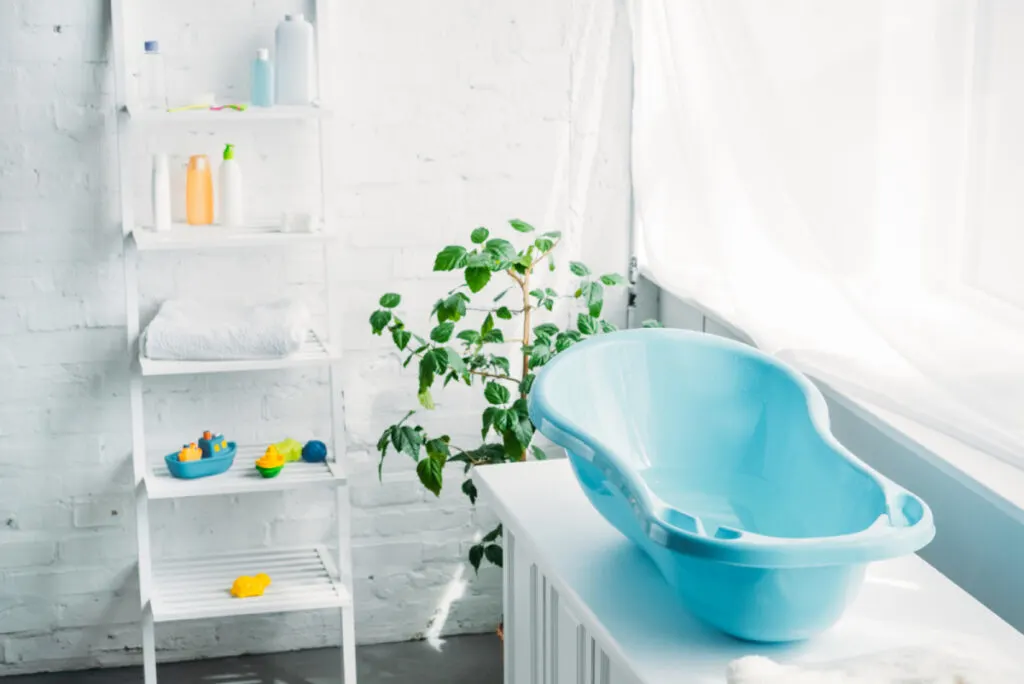
Bath Time Will Be Enjoyable One Day – Promise
All of my older kiddos loved baths.
But my fifth baby? She just flat out hated them and screamed like a banshee the second we tried to put her in the water right up until she was 2-years-old.
Then one magical day, she stopped being afraid of water. Bath time was all of a sudden a delight: she was asking for baths!
It’s crazy how overnight the most stressful baby problems vanish.
One random day, your baby will stop crying after bath time. Don’t give up hope, and may these tips help make baths a little bit easier in the meantime.
Read Next: Baby Fighting Diaper Changes? 9 Parent-Tested Solutions (for less mess)
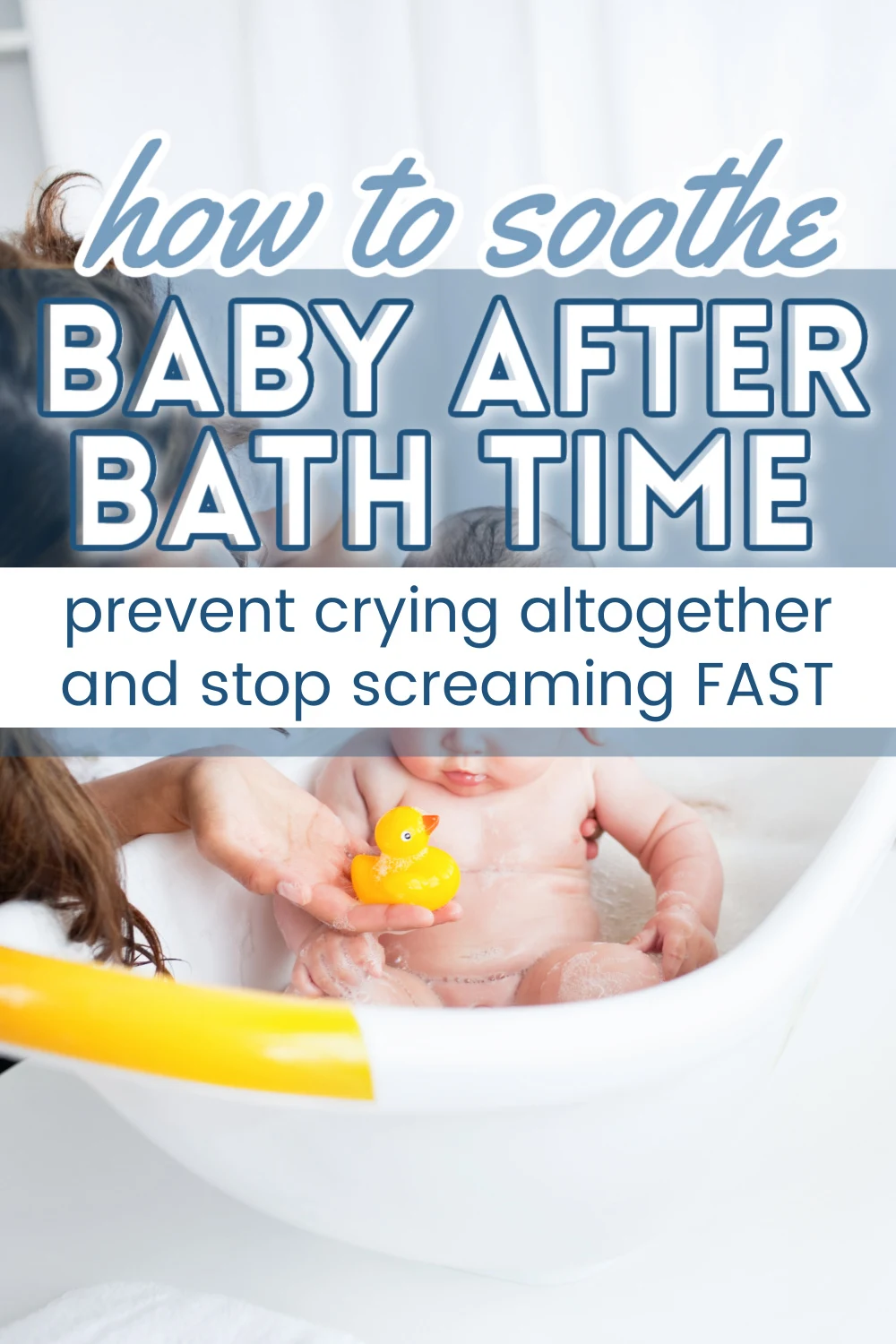
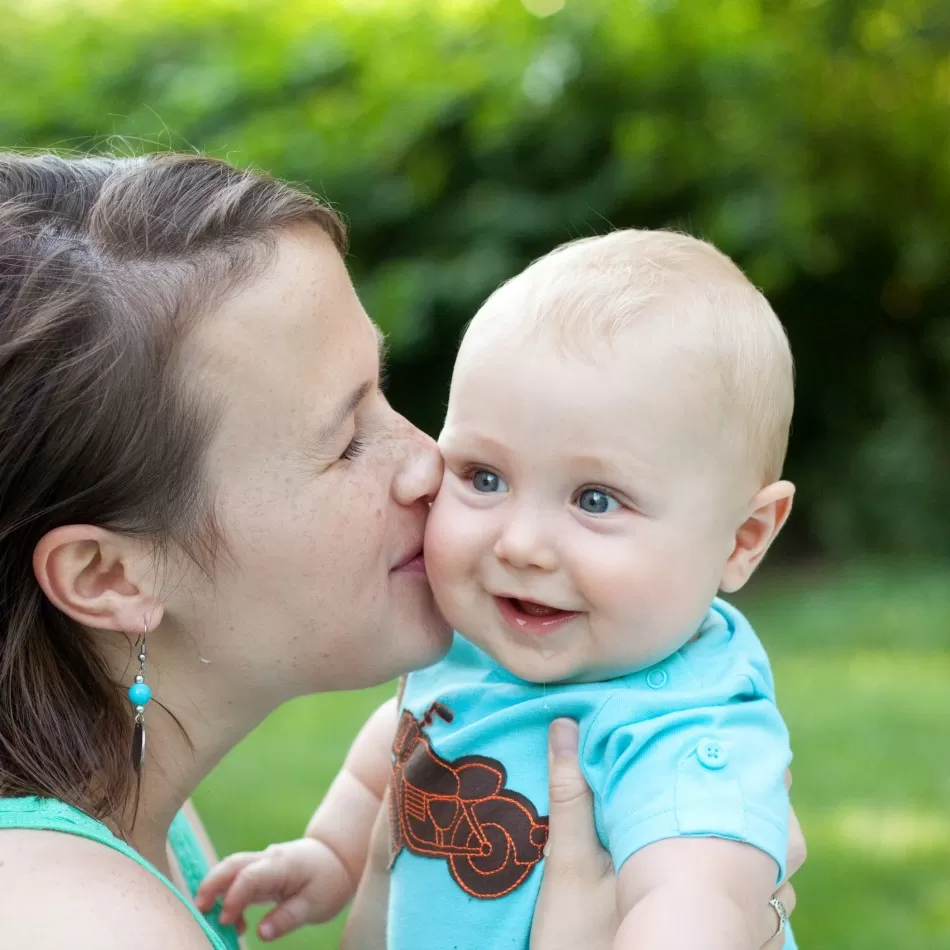
Owner of Growing Serendipity, June could talk to you all day about homeschooling, parenting, and minimalism, which she does at This Simple Balance. When she’s not homeschooling, decluttering, or blogging, she loves to enjoy perfect silence while sipping a hot cup of coffee and thinking uninterrupted thoughts—which, of course, with five kids, doesn’t happen very often.